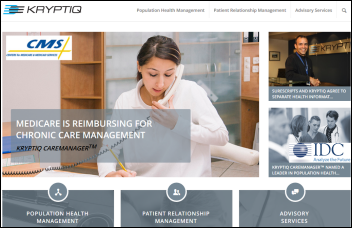Giving a patient medications in the ER, having them pop positive on a test, and then withholding further medications because…
Monday Morning Update 2/2/15
ONC publishes a draft version of its 10-year interoperability roadmap that includes a short-term goal of taking actions that “will enable a majority of individuals and providers across the care continuum to send, receive, find, and use a common set of electronic clinical information at the nationwide level by the end of 2017.” ONC wants to create a governance framework to address the rules of the road for interoperability, improve interoperability standards, use “policy and funding levers” to reward organizations that share data, and clarify that HIPAA requirements don’t stand in the way of interoperability.
A significant portion of the plan addresses patient empowerment, such as the ability to download health information and contribute information to the EHR. It says providers should offer online scheduling, refill requests, telehealth visits, incorporation of wearables data and patient-defined goals of care into the EHR, and shared care planning. ONC also proposes to write policies for “identifying and addressing bad actors” that don’t comply with interoperability guidelines. Public comments are being accepted through April 3.
Reader Comments

From InTheKnow: “Re: [vendor name omitted]. Will announce Monday a strategic partnership with Beth Israel Deaconess Medical Center in Boston which involves their co-development of BIDMC’s homegrown WebOMR. In addition, BIDMC will implement the company’s products.” Unverified. I left out the vendor’s name for reasons that will become apparent should the rumor turn out to be true. WebOMR provides clinical results viewing, notes, problems, medications, order entry, patient lists, and integration with external references. Commercializing hospital-built systems of this scope usually fails, as McKesson can attest given its impending retirement of Horizon Expert Orders, a kludged, quick-to-market version of Vanderbilt’s WizOrder. Vendors usually discover that the product works well for the health system that wrote it, but contains odd technology dependencies and has hard-coded connections to other systems that have to be stripped out while not crippling the core product. BIDMC commercialized its ED software in 2006 under the company name Forerun, about which I’ve heard nothing for several years. Update: a second reliable source says the deal will indeed happen. There will be a lot to talk about once it’s announced.

From HIT Pundit: “Re: ONC’s interoperability roadmap. I predict that the 2017 provider implementation date will be pushed out because of one impossible hurdle it doesn’t address: creating a unique national patient identifier. ONC wants providers to accomplish what Congress refused to deal with through a Rube Goldberg process of virtual and probabilistic patient ID methods and then measure for each provider via the Meaningful Use program the percent accuracy rate for proper patient identification. If our government was willing to deal with this ID issue head on, we could have true interop in six months. My suggestion is this: if a person wants a true health record with coast-to-coast portability, they agree to subscribe to a unique ID. If they want to maintain privacy, they opt out.” I like the idea since Congress refuses to consider a mandatory national patient ID. The government could offer a voluntary, secure patient ID number and then let providers do the job of selling its benefit to their patients.
From Katy Petri: “Re: Sunquest. Laid off 40 people on Friday.” Unverified by the company, but I was given some of the specific names.
HIStalk Announcements and Requests

Twelve percent of poll respondents plan to buy a smart watch in the next year, with two-thirds of those expecting to own an Apple Watch. On the other hand, I recall my 2010 poll in which only 30 percent of respondents said the iPad would have healthcare impact, so I won’t underestimate Apple’s envy-creating marketing. New poll to your right or here: should the federal government issue a national patient identifier? Vote and then click the “comments” link on the poll to explain your position.
I’m getting a lot of inquiries about HIStalkapalooza. I haven’t opened up the “I want to come” page yet since I’m waiting to have a graphic designed. I decided to control the event myself this year, so I had to sign a contract with the House of Blues and the amazing Party on the Moon band way back in the spring before someone else booked the venue, meaning I was personally liable for $150,000 worth of expense (which covers only the HOB’s minimum buy-out charge and the band) without any guarantee that sponsors would step forward. I’m relieved that some great companies that I’ll highlight shortly are supporting the event, which means that, (a) I hopefully won’t go broke after all, and (b) I’ll be able to invite more people.
I don’t follow many people on Twitter, but I’m starting to unfollow those who: (a) post local weather and police updates; (b) share their couch-based hero worship of athletic teams and participants; and (c) live tweet events that didn’t interest me in the first place. Maybe Twitterers should have two accounts (one personal, one professional) or Twitter should add categories that could be suppressed by people looking for health IT insight rather than fervent sports victory prayers.
Last Week’s Most Interesting News
- CMS announces plans to reduce the 2015 Meaningful Use reporting period from 365 days to 90 days.
- ONC releases new Meaningful Use Stage 2 numbers that show only 15 percent of eligible EPs have attested as the deadline draws near.
- Several large health systems collectively agree to move 75 percent of their business to value-based payment by 2020.
- HHS announces that it expects to tie 30 percent of Medicare payments to alternative payment models by 2016.
- The OpenNotes project announces pilot sites for its next phase, OurNotes, in which patients can add their own notes to the electronic chart.
Acquisitions, Funding, Business, and Stock

Surescripts will spin off its population health business into a separate company that will operate under the Kryptiq name. Surescripts acquired Kryptiq in 2012 and will keep its secure messaging, e-prescribing, and portal technologies. Surescripts will maintain a minority ownership position in Kryptiq, which will be run by the former Kryptiq management team.

CPSI announces Q4 results: revenue down 10 percent, EPS $0.60 vs. $0.90, sending shares down 16 percent as the Nasdaq’s fourth-largest percentage loser for Friday. Above is the one-year price chart of CPSI (blue, down 26 percent) vs. the Nasdaq (red, up 13 percent). The company said in the earnings call that hospital EHR penetration is close to 100 percent and sales will have to come from displacements, also showing some concern about increased competition from Epic in the small-hospital market and Athenahealth’s acquisition of RazorInsights. Chairman and CFO David Dye said when pressed by stock analysts to consider reducing headcount in response to lower sales, “We’ve never had any layoffs in the history of the company … we will continue to always think long-term … we’re a hell of a long way from thinking about anything like that.”

Orion Health shares drop on lower than expected sales that the company blames on the “iPhone 6 effect” as its customers wait for new product announcements in April. Orion Health’s shares, which are listed on New Zealand’s NZX, are trading below their November IPO price.
People

Omer Awan (Memorial Hermann Health System) is named VP/senior regional CIO of Eastern Maine Healthcare.
Announcements and Implementations

Drug maker Roche will use Qualcomm Life’s medical device data capture network to connect chronic disease patients with their providers.
Government and Politics

New York legislators propose a one-year delay in implementing the I-STOP law that requires all prescriptions to be transmitted electronically by March 27, 2015, saying that the DEA moved too slowly in certifying vendors to transmit controlled substance prescriptions.
President Obama will propose a $215 million precision medicine initiative that includes $5 million for ONC to develop interoperability standards and privacy requirements for secure data exchange.
The FCC leaves no doubt that it is seriously angry at Marriott for trying to force its hotel guests to buy its Wi-Fi service by blocking their personal hotspots. Marriott had to pay $600,000 to settle with the FCC, but still brazenly pushed the agency to rule whether hotspot-blocking is illegal. The FCC’s response was abundantly clear.
Several hospitals are installing Sky Factory photo or video technologies in walls or ceilings to provide a relaxing, nature-like view even in basement rooms. I almost rigged something similar years ago for my office in the hospital basement, where I was going to mount an LED monitor in a window-like frame and pipe in video from a outside webcam.
A Maine newspaper covers the use of predictive analytics to identify people likely to require an ED visit to support early intervention. The program is run by HealthInfoNet, which collects EHR data from 32 of the state’s 36 hospitals and 300 outpatient facilities. The software and algorithms provided by HBI Solutions, which was founded by former Eclipsys executives and clinicians from Stanford University, logged a 74 percent accuracy rate in predicting ED visits.
Other
Weird News Andy asks, “Who you gonna call?” in referring to a decision by one of England’s NHS trusts to ration its overloaded ambulance service by downgrading 999 calls (their equivalent of 911) from patients known to be terminally ill or who had signed “do not resuscitate” requests. The since-rescinded policy was in effect for two months, during which time 57 patients died after their emergency calls were changed to low priority.
Sponsor Updates
- TeraMedica’s Evercore VNA is named a KLAS category leader in “VNA/Image Archive.”
- Victor Lee, MD writes about “Health IT and Care Coordination” in a Zynx Health blog post.
- ZirMed will exhibit at the 2015 Combined Sections Meeting of the American Physician Therapy Association February 4-7 in Indianapolis.
- Huron Consulting employees logged over 5,500 hours of service and participated in more than 100 philanthropic events in 2014.
- Voalte Technical Writer Ashley Murphy asks “Is There a Voalte Solution for First-Time Parents?” in the latest company blog.
- Verisk Health features “Three Questions for the CMS Star Ratings Expert” Melanie Richey in its latest blog.
- Forbes interviews TransUnion Senior VP Julie Springer about the company’s new brand launch.
- TeleTracking Technologies VP/GM Josh Poshywak writes about fighting infection with RTLS for Health Management Technology.
- Stella Technology expands its corporate headquarters in a move to Sunnyvale, CA.
- Sentry Data Systems will exhibit at the 340B Coalition Winter Conference February 4-6 in San Francisco.
- Amy Krane recaps how Partners Healthcare eliminated prior authorization using Qpid Health technology.
- Nordic wraps up its “I Heart Cupid” video series on Epic’s cardiovascular information system.
- MEA/NEA’s Lindy Benton writes about the “Return of the RACs.”
- The New York eHealth Collaborative will participate in the eHealth Initiative 2015 Annual Conference & Members Meeting February 3-5 in Washington, DC.
- Patientco Marketing Specialist Patrick Creagh offers “7 Things You Need to Know About Your Patient Payments.”
- Porter Research President Cynthia Porter offers insight into “Thought Leadership and Credibility Content in Healthcare B2B.”
- PMD offers “PQRS Solutions for the New Year.”
- Nvoq offers SayIt 9.3 with new features that simplify use and enhance organizational productivity.
- Passport Health will exhibit at the Athenahealth Marketplace Fair February 3-4 in Boston.
- Orion Health EVP of Healthier Populations David Bennett shares his thoughts on population health
- Navicure’s Jeff Wood covers “How Answering Patient Questions can Boost Your Practice’s Revenue.”
- The local business paper highlights the success Lexmark has had since acquiring Perceptive Software.
- NTT Data opens an operations center in Bangalore, India.
Contacts
Mr. H, Lorre, Jennifer, Dr. Jayne, Dr. Gregg, Lt. Dan.
More news: HIStalk Practice, HIStalk Connect.
Get HIStalk updates.
Contact us online.







I have had suspicions that some airports are blocking personal hot spots as well. Hartfield in ATL is especially challenging with my AT&T iPhone hot spot.
Re: National Patient Identifier
I agree with the need for a National Patient Identifier. If only we had a system where a short, easily remembered ID (maybe a 9 digit number) was assigned to every citizen at birth or nationalization. The expectation would be that this number was kept secret, but in reality it would be demanded as identification for multiple uses. What am I saying, a system like this would cost billions and never be accepted by everyone.
I’m with you re Twitter; I have two accounts, with one entirely for work. I tried the ‘List’ feature as another way to separate, but that didn’t work.
I fully agree w HIT Pundit…in fact I know the guy really well.
The part that really galls me is on page 91 in a foot note ONC acknowledges the issue and Congress’ unwillingness to deal with it. They state in the foot note:
While HIPAA required the creation of national identifiers for patients, providers, hospitals and payers in 1996, subsequent legislation prohibited HHS from funding the promulgation or adoption of a national unique patient identifier. Public Law 105–277. 105th Congress. October 21, 1998. http://www.gpo.gov/fdsys/pkg/PLAW-105publ277/pdf/PLAW-105publ277.pdf
So lets just push it off onto providers/vendors. Then when the system doesn’t work the bureaucrats can just blame the industry and create more regs to get ‘unco-operartive’ providers/vendors to FIX IT!
@HITPundit “My suggestion is this: if a person wants a true health record with coast-to-coast portability, they agree to subscribe to a unique ID. If they want to maintain privacy, they opt out.” I like the idea since Congress refuses to consider a mandatory national patient ID. The government could offer a voluntary, secure patient ID number and then let providers do the job of selling its benefit to their patients.”
You have just described what CommonWell is doing. Very succinctly I might add.
The only exception being that CW does not create a new ID. It leverages an existing strong ID that the patient allows CommonWell to use to link their records together.
Bob
Bob,
Unfortunately a “strong ID” basically means a Rube Goldberg solution still subject to people /system error. Better than nothing, but again why not just assign one (maybe SSN or similar) and let people decide to adopt it, or not.
As an example, right now for MU you must ask a patient their ethnicity but they can refuse to answer and that is a valid MU response and the provider is not penalized. Could do same for the ID.
In my forty+ years in HIT one thing I have learned is that politics and system design make terrible bed fellows. My frustration is why require vendors/providers to create a mashed up ID if the govt acknowledges it as a core requirement for interop but won’t step up?
One last thought…(I promise). I see Mr. H has started a survey as to whether the feds should issue a unique patient ID.
A follow up survey should ask this audience:
If the feds assigned you a unique health care ID…would you use it (opt in or out) ??
RE unique patient ID – that is a thorny issue as it does set things up for a “national Identity” which can be abused by the wrong people in office. However, I believe I read where it was promised that our SSN would not be used in that manner when it was first proposed, yet it seems I have to use it many places – like opening a bank account ( I know, I know it is for tax purposes), on a recent loan application, when doing a credit check – just to name a few – but that is not the way it was sold to the citizens originally. It was for operating the SS system only, and administering the funds.
I worked for a bank many moons ago and we decided to use the SSN to tie all accounts that a person had together. That idea lasted about 15 seconds. I would vote no to assigning a national number. How about using the computer logic we have now found in Master Person Indexes where a system figures out what is linked, yet continues to address the patient by the number/ID of the originating system when speaking to it?
RE wireless blocking. Does this mean (hope, hope) that blocking is not permitted anywhere, not just Marriotts? (It appears so, from the article). Like EVERY convention center I go to that claim ownership of the airspace inside and thus you must use their Internet and wireless networks if you want to connect to the cloud while on prem? At $100 or more per day for the privilege?
Or worse, Brand “X” communications company obtains exclusive rights inside the building (because they operate the connectivity and pay off the venue), so if you have Brand “Y” as your carrier, you are blocked?
I agree with the ATL airport comment above, although I have an aircard from a major vendor that gives me good connectivity while I wait for flights there. It isn’t a hot spot (which I define as being able to share bandwidth with other devices) but a one-to-one plug in antenna that serves my laptop directly.